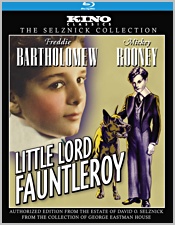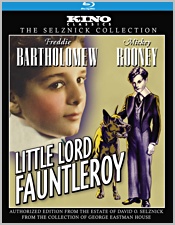Little Lord Fauntleroy (Blu-ray Review)

Director
John CromwellRelease Date(s)
1936 (June 26, 2012)Studio(s)
Selznick International Pictures (Kino Lorber)- Film/Program Grade: A+
- Video Grade: C+
- Audio Grade: D-
- Extras Grade: N/A
Review
By the mid-1930s, David O. Selznick was developing a reputation for top-notch adaptations of the classics to film, having clicked with such efforts as David Copperfield, Anna Karenina, and A Tale of Two Cities - all in 1935 while still with MGM. So his desire to do an adaptation of "Little Lord Fauntleroy" was no surprise, even if some people had apprehensions due to the dated nature of the story and the image that the name "Fauntleroy" by then invoked - that of a sissy in a velvet suit.
The Victorian era classic by Frances Hodgson Burnett had been popular for many years and was another of Selznick's childhood favourites. The screen rights were actually owned by Mary Pickford at the time, as she had starred in a silent version which had been one of her biggest successes, but she consented to Selznick's remake as his pictures would now be released through her company, United Artists.
The story was of a young widow and her son Ceddie living in 1880s Brooklyn, following the death of her husband, an English army captain. The captain's father, the Earl of Dorincourt in England, had denounced his son for marrying an American and had refused to have any contact with the young wife. At age nine, however, Ceddie is summoned to England to assume the title of Lord Fauntleroy, the Earl's successor. Ceddie's mother (whom he calls "Dearest") recognizes the great opportunity and convinces Ceddie to go to England, even though it will mean that she and Ceddie must live there in adjacent but separate houses because of the Earl of Dorincourt's dislike for her. Ceddie meets the Earl and soon begins to charm him through his politeness, courtesy, and common sense. The Earl starts to overcome his poor reputation for being uncaring and distant as a result, and the two are soon almost inseparable. At this point, a counter-claim for the title of Lord Fauntleroy is made by another woman and her ill-mannered son Tom. She claims that she was married to the Earl's eldest son and that her Tom thus takes precedence over Ceddie as the true heir to the Fauntleroy title. The Earl of Dorincourt is floored by this possibility and it seems that there is no way out until help comes from an unexpected source.
Selznick's best casting decision was to secure Freddie Bartholemew's services from MGM to play Ceddie. Bartholemew was quite an outstanding young actor who could convey the various nuances of the character. He always had an aristocratic air about him that was obviously essential for the role at hand, but he could get down and dirty when needed. In Little Lord Fauntleroy, he needed to early on in order to deal with a gang of neighbourhood bullies who try to take his new bicycle. His willingness to mix it up if ultimately needed even though he'd rather reason his way out of it brings a dimension to the character that lifts it above so many others of its kind. Bartholemew was able to convey that dimension believably. To play Dearest, Selznick enticed Dolores Costello to return to the screen. Costello had been a reliable leading lady of silent films with a few roles in early sound films and was for a time married to John Barrymore (hence her cast listing as Dolores Costello Barrymore). As with the role of Ceddie, that of Dearest was more than skin deep. The surface, or outer, appearance of the character was one of reliance on others (somewhat akin to David Copperfield's Dora), but that hid a strength of purpose that was mainly manifest in how she deals with the Earl. Costello balanced the two aspects most effectively.
For the rest of the roles, Selznick assembled a fine cast of familiar faces. For the American component of the story, we have Guy Kibbee as Mr. Hobbs, Mickey Rooney as Dick (Ceddie's pal of the streets), Una O'Connor as Mary, and Jessie Ralph as the apple woman. For the British component, the Hollywood English contingent was out in force: C. Aubrey Smith superb as the Earl of Dorincourt, Henry Stephenson as the Earl's solicitor Havisham, and E.E. Clive as Sir Harry Lorridaile. Hollywood nearly always succeeded in giving a real British feel (if somewhat idealized) to the films that required it and it did so here again most emphatically.
The film is competently directed by John Cromwell from a screenplay by Hugh Walpole with the usual contributions by Selznick himself. The final production cost was a little over $500,000 - somewhat high for the time, but the film was well received and apparently returned a nice profit. It deserved to. Watching the final product is an entirely enjoyable experience. The story is solid and the acting top-notch - all contributing to a general feeling at the end of having spent a pleasant hour and forty minutes among friends.
Now Kino Lorber has released the film on Blu-ray as an authorized edition of its Selznick Collection via the collection of George Eastman House. The 1.37:1 Blu-ray image is far and away the best the film has ever looked on home video. There are some scratches and speckles to be sure, but the image actually looks quite sharp a lot of the time, and image detail is very good, characterized by a very agreeable grayscale. Modest film grain is clearly apparent, but not apparent is any untoward digital manipulation. The mono LPCM sound is workable enough in terms of clear dialogue, but there are some crackle, variable volume levels, and low hiss that can intrude at times. The film’s score is the work of the well-known Max Steiner. Disappointingly, the disc offers no supplements about the film. There are only a few trailers of several of Kino’s other classic Blu-ray releases.
The film easily stands on its own two feet, however, and on Kino’s Blu-ray release rates a very easy recommended purchase however.

